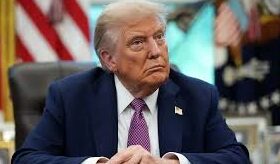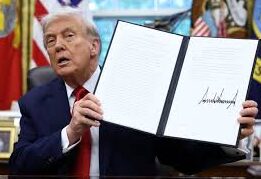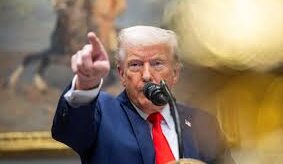U.S. President Donald Trump has called on the European Union to slap tariffs of up to 100 percent on China and India in a bid to force Russian President Vladimir Putin to end the war in Ukraine.
The proposal came during a meeting between U.S. and EU officials, first reported by the Financial Times, where options to increase economic pressure on Moscow were discussed.
Trump is pushing hard to broker a peace deal between Moscow and Kyiv as Russia intensifies its strikes. Over the weekend, a Russian missile hit Ukraine’s main government building in Kyiv in what was seen as both symbolic and a major escalation. Ukraine reported the heaviest aerial bombardment since the war began, with at least 810 drones and 13 missiles used.
On Tuesday, more than 20 civilians were killed in eastern Donas when a Russian glide bomb struck people waiting in line to collect their pensions.
Speaking to reporters, Trump said he was “not happy with the situation” and warned of tougher sanctions on the Kremlin. He also said he plans to speak with Putin by phone this week or early next.
Trump has repeatedly threatened harsher measures against Moscow, but so far Putin has ignored deadlines and sanction threats without altering course. Last month’s much-anticipated summit in Alaska between U.S. and Russian leaders ended without a peace agreement.
His latest push came after U.S. Treasury Secretary Scott Bessent said Washington is ready to increase pressure but needs stronger European backing.
Trump also said the U.S. is in talks with India to reduce trade barriers. Writing on Truth Social, he announced plans to speak with Indian Prime Minister Narendra Modi soon and expressed optimism for a “successful outcome.” Modi echoed that sentiment, calling the U.S. and India “close friends and natural partners,” and said both teams are working to wrap up talks quickly.
Analysts see the exchange as a fresh sign of reconciliation after recent U.S.-India trade tensions. Just last week, Trump stressed the “special relationship” between the two countries, saying there was “nothing to worry about.”
China and India remain among the biggest buyers of Russian oil, helping sustain Moscow’s economy. Last month, the U.S. imposed 50 percent tariffs on Indian goods, including an additional 25 percent penalty linked to its transactions with Russia.
While the EU has pledged to end reliance on Russian energy, about 19 percent of its natural gas imports still come from Moscow. If Brussels agrees to Trump’s demand, it would mark a shift from targeting Russia with direct sanctions to punishing its key trading partners instead.






